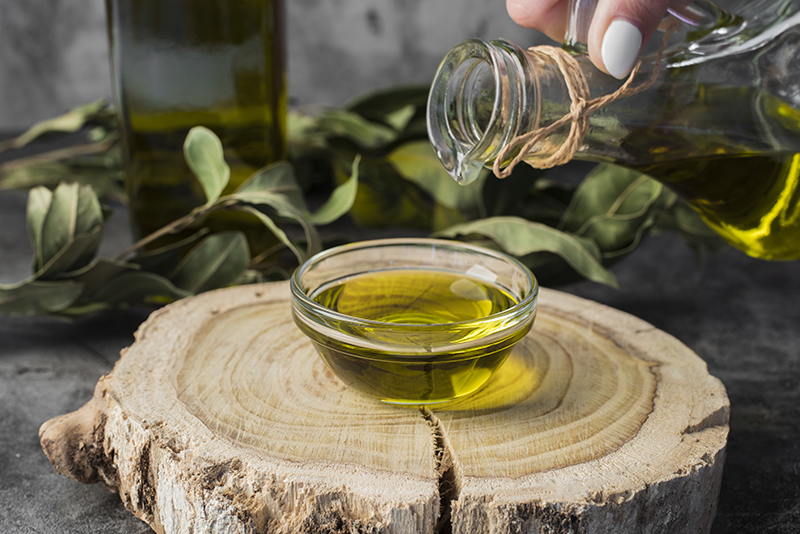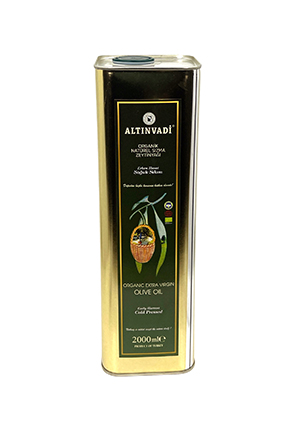Olive Oil Types And Usage
The harvest made when the green color of the olives starts to change is called as 'Early Harvest'. Olive oils obtained from olives collected during this period generally contain low oleic acid (such as 0.2-0.3%) and high polyphenols. Olive oils have varying levels of bitterness and burning, depending on the olive type and harvest.
The high levels of antioxidants and polyphenols, also known as biophenols, in olive oil increase the bitterness level.
Olive oil should be stored at room temperature and in cool environments, away from sunlight. Olive oil, which does not start to freeze below +10 degrees, does not lose its properties after melting.

The color of olive oil is between yellow and green and may vary depending on the type of olive and harvest time.
It is not correct to speculate about the quality of olive oil by looking at its color.
Olive oils are classified in terms of factors such as production method and acidity level.
It is divided into three main groups in terms of production stage;
- NATURAL OLIVE OIL produced naturally by cold pressing method
- REFINED OLIVE OIL produced by going through various refining processes
- RIVIERA OLIVE OIL produced in a mixture of natural and refined olive oil.

NATURAL OLIVE OIL is divided into two types in terms of acidity.
a. Extra Virgin Olive Oil
Extra virgin olive oil is the most healthy and delicious type of olive oil and is produced by cold pressing and without exposure to any chemicals, with a maximum of 0.8% according to the International and Turkish Food Codex free acidity (as oleic acid) level. The peroxide value is at most 20. (It is specified in the US Food and Drug Administration (FDA) and European Food Safety Office (EFSA) regulations.)
KÜPYAG produces Extra Virgin Olive Oil in compliance with many Turkish and International standards such as FDA, ISO, KOSHER and having these certificates.
Moreover; Olive oil, which is obtained from trees where no chemicals are mixed into its soil, water, fertilizer, and produced without any chemical stages, is called ORGANIC NATURAL EXTRA OLIVE OIL. Soil, production process and product are certified and inspected by Authorized Organic Certified institutions.
KÜPYAG has organic olive processing and packaging certificate and can produce extra virgin, organic extra virgin olive oil.
Areas of use: It is used for breakfast, salads, all cold and hot meals, and all kinds of cakes and pastries. Natural extra virgin olive oil is the most perfect and healthiest type of olive oil.
b. Virgin Olive Oil
It is a natural olive oil with a free acidity level between 0.8% and 2.0 grams. The bitterness level of this olive oil is less than that of extra virgin olive oil.
Virgin olive oil is the most valuable oil after Extra Virgin Olive Oil and is rich in vitamins and minerals.
KÜPYAG produces Virgin Olive Oil in compliance with many Turkish and International standards such as FDA, ISO, KOSHER and having these certificates.

2- REFINED OLIVE OIL (REFINED OLIVE OIL):
It is a type of olive oil that is produced by various processes without causing any change in the structure of the olive, and has a free acidity level of at most 0.3%. KüpYAĞ does not produce refined olive oil.
Areas of use: Refined olive oils are mostly used in hot dishes and frying.
3- RIVIERA OLIVE OILS (PURE OLIVE OIL)
It is a type of olive oil that is obtained by mixing refined olive oil and natural olive oil in different proportions and has a free fatty acidity degree of maximum 1.0%. KüpYAĞ does not produce refined olive oil.
Areas of Usage : Refined olive oils are mostly used in hot dishes and frying.
POMACY OIL (POMACE OLIVE OIL)
It is a type of oil that is not considered an olive oil class, but is obtained as a result of the second pressing and refining of the olive oil pulp. Refined Pomace Oil is used by fast food companies (for frying) and cosmetics companies.
Zeytinyağı Çeşitleri ve Kullanım Alanları
Zeytinlerin, yeşil renginin değişmeye başladığı dönemde yapılan hasata ‘Erken hasat’ denir. Bu dönemde toplanan zeytinlerden elde edilen zeytinyağları, genelde düşük oleik asitli (% 0.2 -% 0.3 gibi) ve yüksek polifenol içermektedir. Zeytinyağlarında, zeytin cinsine ve hasat durumuna göre değişen acılık ve yakıcılık seviyesi vardır.
Zeytinyağı içindeki antioksidan ve polifenollerin diğer adıyla biofenollerin değerlerinin yüksek olması acılık seviyesini artırmaktadır.

Zeytinyağı, oda sıcaklığında ve gün ışığına maruz kalmadan, serin ortamlarda saklanmalıdır. +10 derecenin altında donmaya başlamayan zeytinyağı, eridikten sonra özelliğinden kayıp yaşamamaktadır.
Zeytinyağının rengi sarı ile yeşil arası olup, zeytinin cinsine ve hasat zamanına göre değişebilir. Rengine bakarak zeytinyağı kalitesi hakkında fikir yürütmek doğru değildir.
Zeytinyağları üretim şekli, asidite seviyesi gibi faktörler bakımından sınıflandırılmaktadır.
Üretim aşaması bakımından üç ana gruba ayrılır;
- Soğuk sıkma yöntemiyle doğal olarak üretilen NATÜREL ZEYTİNYAĞI
- Çeşitli rafine işlemlerinden geçilerek üretilen RAFİNE ZEYTİNYAĞI
- Natürel ve Rafine zeytinyağının karışımında üretilen RİVİERA ZEYTİNYAĞI olmak üzere üç ana gruba ayrılır.

1- NATÜREL ZEYTİNYAĞI
Asidite durumu açısından iki çeşide ayrılır;
a. Natürel Sızma Zeytinyağı (Extra Virgin Olive Oil)
Natürel sızma zeytinyağı en kusursuz zeytinyağı çeşididir ve Uluslararası ve Türk Gıda Kodeksi serbest asitlik (oleik asit cinsinden) derecisine göre maksimum % 0.8 olan, herhangi bir kimyasala maruz kalmadan ve soğuk sıkım sürecinden geçirilerek üretilen zeytinyağıdır. Peroksit değeri, en çok 20’dir. (ABD Gıda ve İlaç İdaresi (FDA) ve Avrupa Gıda Güvenliği Ofisi (EFSA) yönetmeliklerinde belirtilemektedir.)
KÜPYAĞ; FDA, ISO, KOSHER gibi Türk ve Uluslararası bir çok standartlara uygun ve bu sertifikalara sahip olarak Natürel Sızma Zeytinyağı üretimi yapmaktadır.
Ayrıca; toprağına, suyuna, gübresine herhangi bir kimyasalın karıştırılmadığı ağaçlardan elde edilen zeytinlerden üretilen zeytinyağlarına ORGANİK NATÜREL SIZMA ZEYTİNYAĞI olarak sınıflandırılır. Toprak, üretim süreci ve ürün Yetkili Organik Sertifikalı kurumlar tarafından sertifikalandırılır ve denetlenir.
KÜPYAĞ, organik zeytin işleme ve ambalajlama sertifikasına sahip olup, naturel sızma, organik naturel sızma zeytinyağı üretebilmektedir.
Kullanım alanları: Kahvaltıda, salatalarda, tüm soğuk ve sıcak yemeklerde, her türlü pasta ve börek yapımında kullanılmaktadır. Naturel sızma zeytinyağı en kusursuz ve en sağlıklı zeytinyağı çeşididir.
b. Natürel Birinci Zeytinyağı (Virgin Olive Oil)
Serbest asitlik seviyesi % 0.8 ile % 2.0 gram arasında olan Natürel zeytinyağıdır. Bu zeytinyağın acılık seviyesi, natürel sızma zeytinyağına göre daha azdır.
Natürel özelliği nedeni ile Natürel Sızma Zeytinyağı'ndan sonra en değerli yağdır ve vitamin ve mineral bakımından oldukça zengindir. KÜPYAĞ, naturel birinci zeytinyağı üretebilmektedir.
Kullanım Alanları: Kahvaltı ve salatalarda, tüm soğuk ve sıcak yemeklerde, her türlü pasta ve börek yapımında ve kızartmalarda kullanılmaktadır.

2- RAFİNE ZEYTİNYAĞLARI ( REFINED OLIVE OIL) :
Zeytinin yapısında değişikliğe yol açmadan, çeşitki işlemlerden geçirilerek üretilen ve serbest asitlik derecesi en çok % 0.3 olan zeytinyağı türüdür. KÜPYAĞ, rafine zeytinyağı üretimi yapmamaktadır.
Kullanım alanları: Rafine zeytinyağları daha çok sıcak yemeklerde ve kızartmalarda kullanılmaktadır.
3- RİVİERA ZEYTİNYAĞLARI ( PURE OLIVE OIL)
Rafine zeytinyağı ile natürel zeytinyağının değişik oranlarda ile karıştırılması sonucu elde edilen ve serbest asitlik derecesi en çok % 1.0 olan zeytinyağı türüdür. KÜPYAĞ, rafine zeytinyağı üretimi yapmamaktadır.
Kullanım Alanları: Rafine zeytinyağları daha çok sıcak yemeklerde ve kızartmalarda kullanılmaktadır.
PRİNA YAĞI (POMACE OLIVE OIL)
Bir Zeytinyağı sınıfından sayılmayan ancak zeytinyağı posasının ikinci kez preslenmesi ve rafine edilmesinden sonucu elde edilen çıkan bir yağ çeşidir. Rafine Prina Yağı, fastfood firmaları(kızartma amaçlı) ve kozmetik firmaları tarafından kullanılmaktadır.


















